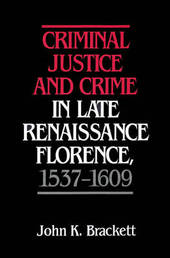
|
Criminal Justice and Crime in Late Renaissance Florence, 1537-1609
Paperback / softback
Main Details
| Title |
Criminal Justice and Crime in Late Renaissance Florence, 1537-1609
|
| Authors and Contributors |
By (author) John K. Brackett
|
| Physical Properties |
| Format:Paperback / softback | | Pages:176 | | Dimensions(mm): Height 229,Width 152 |
|
| ISBN/Barcode |
9780521522489
|
| Classifications | Dewey:364.9455109031 |
|---|
| Audience | | Professional & Vocational | |
|---|
| Illustrations |
Worked examples or Exercises
|
|
Publishing Details |
| Publisher |
Cambridge University Press
|
| Imprint |
Cambridge University Press
|
| Publication Date |
22 August 2002 |
| Publication Country |
United Kingdom
|
Description
This book uses as an index of princely power a thorough examination of the major elements of the Florentine system of criminal justice--court of the Otto Di Guardia e Balia (Eight on Public Safety), police, prisons, relations with lesser courts in the dominion--which reveals the extent of their effectiveness in the capital city and the subject territory. The author's analysis reveals the determinative role played by the fiscal limits placed on the system. These limits are more important to understanding the character of the system than is any ideology of repression or absolutism. In fact, the system of criminal justice was one of negotiation, in which various players, all with some power, deployed strategies that helped them to realize their interests. Thus, the system was flexible and relatively moderate. By this index, the terms "absolutist" and "absolutism" are not helpful in understanding the type of power exercised by the Medici Grand Dukes.
Reviews"This is an important book on a neglected topic and period of Florentine history. It adds texture to the increasingly lively debate about the origins of the modern state, and it further qualifies the received wisdom that Medicean Tuscany was 'absolute.'" Carol Bresnahan Menning, Sixteenth Century Journal "[Brackett's] conclusions are persuasive and his presentation of the Otto sober and judicious." Times Literary Supplement
|